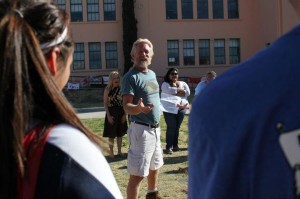Three Spheres of Influence: Community, Economics, and Environment
While we can divide our endeavors into these three areas, it is important to point out that these separations are artificial. We achieve the best outcome when we remember how interrelated economics, environment, and community are in our lives, and in the lives of every human being.
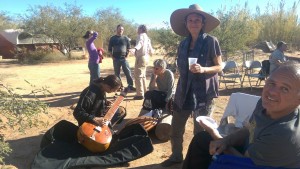
COMMUNITY
Environmental stewardship and economic solvency are excellent goals. But such ambitious endeavors are pursued to their fullest potential within the context of a strong community. We are not just a group of people collaborating on a project. We are people who share values, experiences, friends – and a vision.
Harmony & Health Foundation maintains several types of community programming, and has several more in development. A weekly sweat and potluck dinner, a weekly women’s sweat, a weekly contemplative movement class, a monthly song and story fire circle, and a monthly brunch are all regularly occurring activities. We also enjoy spontaneous get-togethers, such as group meals and movie nights, and large events, such as our annual Bhakti Celebration (co-hosted with TerraSante Village.) These common experiences create a bond of fellowship amongst us. They also allow supporters from Tucson to visit and become involved. Beyond the land, we enjoy ties to sister communities (Wind Spirit and Sacred Space) and to sister organizations (Sustainable Tucson and the Peace Center). Within our community is the Sacred Earth Church, a non-denominational, spiritual, loosely organized church. The SEC is based around the the Harmonic Chapel, uses sound vibrations and song in worship, and recognizes all life and land as sacred.
Another dimension of our community is healing activities and events. First and foremost for us is the land. Just being in our desert oasis has a healing effect on those who visit. We participate in ascension circles, toning, smudging, and energy work, and have hosted yoga classes and spiritual retreats. For now, we hope that the peace, love and positive energy we cultivate here flows outward to the greater Tucson community. In the future, we will be hosting more healing and fellowship-based events – both on the land and in the city.
ECONOMICS
In our context, economics is about the ways for Harmony & Health Foundation to sustain itself monetarily. Both the nonprofit organization and its members need to earn funds. Funding is a multi-fronted endeavor, with donations, fundraising events, sponsorships, endowments, grants, work/trade, volunteers, sharing, and cottage industries all playing their part. We are a small group at this point, and anticipate more fully engaging in all of these avenues as we move forward.
ENVIRONMENT
Harmony & Health Foundation acknowledges that humanity must drastically change our treatment of Mother Earth. The patterns of use and extraction used by the industrialized world for the past centuries is not the system we want or need. Our organization is dedicated to responsible stewardship of the land.
So what makes a good steward? Environmentally responsible stewardship is far more than having a gas-efficient car, recycling, and using cloth grocery bags. Stewardship involves preservation, rejuvenation, education, sustainable permaculture, alternative energy, and the classic standby of Reduce, Reuse, Recycle.
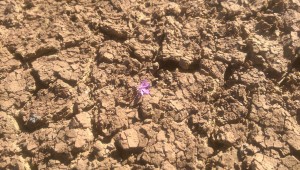
Preservation
It is important to set aside pieces of wild or nearly wild land. That’s why we have National Parks, Forests, State forests, and wilderness areas. Those are on a much larger scale, but even in our small corner of Arizona, we can do our part to protect nature as it exists without human interference. We have designated a portion of Harmony & Health land as the Nature Sanctuary. That land will not be used for habitation or agriculture. It will be a space for desert life to continue without our meddlesome ways.
Rejuvenation
With the right knowledge and skills, human interference can actually improve an environment, restoring it after previous damage or enhancing it to a level that can support even more wildlife. The Bowl is a scar on our land, leftover from the construction of Ajo Highway. Our goal is to create a Sustainable Oasis around and in the Bowl, with swales, berms, terraces and other earth-sculpting for water collection and cultivating an explosion of natural growth.
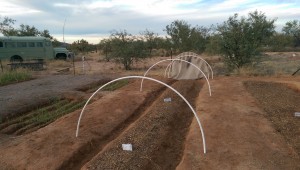
Sustainable Permaculture
Permaculture is an approach to farming that doesn’t damage the land. It includes many tools, such as rain-water harvesting, crop rotation, no-till planting, cover crops, probiotic inoculants, native plants and varieties, and organic compost. Our goal is to create food forests and hugelkulture beds that do not require extensive irrigation, that do not increase erosion, that renew the nutrients and microorganisms in the soil, that are free of chemicals, and that produce enough food to feed our community.
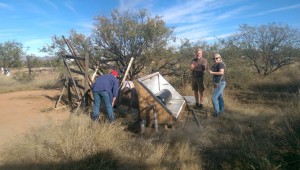
Alternative Energy
Due to our location in Arizona, our number one resource is sunlight. We already take advantage of the powerful rays through passive solar water heaters and solar ovens. As we expand, we will be adding small solar-charging stations and eventually a solar panel array. In addition to the solar resource, there is also great potential in wind power. The majority of our days are quite windy, and many are extremely windy. We are on a floodplain of mesquite trees on the very edge of the Sonoran Desert, so the winds come whipping through with no large forest or rocky outcroppings to deter them. We are exploring the possibilities of installing a windmill and what that would entail.
Reduce, Reuse, Recycle
The 3 Rs have been around for years now. Many families do what they can to reduce their consumption, reuse items when possible, and recycle all the materials they’ve used. We take this to the extreme, with a shared space set aside for used materials. Anyone who’s in need of an item or material for a project checks there first. It’s amazing what innovative uses we’ve found for what other people would label “trash”!
Education
Doing all of these projects is rewarding and will continue to be worthwhile. But what about everyone else? We feel that we aren’t fully serving our community if we don’t become an educator, assisting others in becoming more environmentally responsible. We will continue to offer workshops on sustainable practices and homesteading skills (alternative building materials, composting toilets, seed harvesting, rainwater collection, etc.) We are also in the process of becoming a Rural Business Incubator, facilitating the launch of sustainable small businesses and helping existing businesses become more sustainable.
